I slumped and crossed my legs, showing that there was plenty of time. I shook my head. “Not even the second section. I’m just looking for scraps that may not be fit to print. About Paul Jerin and the Gambit Club.”
“You don’t say.” He ran a palm over his hair, which was almost black and slicked back and up over his sloping dome. I knew that gesture well, but had learned the hard way not to try to interpret it. He was next to the best of the poker players I spent one night a week with, the best being Saul Panzer, whom you will meet later on. He asked, “Doing research for a treatise on adult delinquency?”
“All I would need for that would be a mirror. Nero Wolfe is inquiring into certain aspects of the matter.”
“Well well. Just for curiosity?”
“No. He has a client.”
“The hell he has. For release when?”
“Oh, tomorrow.”
“Who’s the client?”
“I don’t know. He won’t tell me.”
“I’ll bet he won’t.” Lon leaned forward. “Now look, Archie. It’s basic. In a newspaper sentences must always be active, never passive. You can’t say ‘Mr. Kaczynski was bitten by a woman today.’ You must say ‘Miss Mabel Flum bit Mr. Kaczynski today.’ The lead-off on this must be, ‘Daniel Kalmus, attorney for Matthew Blount, has engaged Nero Wolfe to get evidence that Blount did not murder Paul Jerin.’ Then further along mention the fact that Wolfe is the greatest detective this side of outer space and has never failed to deliver, with the invaluable assistance of the incomparable Archie Goodwin. That’s the way to do it.”
I was grinning at him. “I like it. Then the next day you could feature Kalmus’s denial.”
“Are you saying it’s not Kalmus?”
“I’m not saying. What the hell, it’s just as good, even better, leaving it open who hired him, hinting that you know but you’re not telling. Next day they’ll buy a million Gazettes to find out.”
“Are you going to fill it in any? Now?”
“No. Not a word. Just that he’s been hired and has been paid a retainer.”
“Can we say we have it direct from you?”
“Sure.”
He turned and got at a phone, the green one. It didn’t take long, since he only had enough for one short paragraph. He hung up and turned to me. “Just in time. Now for tomorrow’s follow-up. I don’t expect words and music, but what’s the slant that makes Wolfe think—”
“Whoa.” I showed him a palm. “You’ve got the gall of a journalist. It’s my turn. I want everything about everybody that you know or guess but haven’t printed.”
“That would take all night. First, off the record, does Wolfe actually expect to spring Blount?”
“Off the record, that’s the idea.” I had my notebook out. “Now. Have they found a container with arsenic in it?”
“I’ll be damned.” His head was cocked. “Does Wolfe know that Blount went down to the kitchen for the chocolate and took it up to Jerin?”
“Yes.”
“Does he know that after Jerin had drunk most of the chocolate Blount took the cup and pot away and rinsed them out?”
“Yes.”
“Does he know that Blount chased Jerin out of his apartment and told him to stay away from his daughter?”
“No. Do you?”
“I couldn’t prove it, but the word is that the cops can. And one of our men got it — a good man, Al Proctor — he got it from a friend of Jerin’s. Do you want to talk to Proctor?”
“No. What for? That would only help on a motive for Blount, and since Blount’s innocent why waste time on it? Have they—”
“I will be damned. My God, Archie this is hot! Come on, give! Off the record until you say the word. Have I ever fudged on you?”
“No, and you won’t now. Skip it, Lon. Nothing doing. Have they found a container?”
He reached for a phone, sat a moment with his fingers on it, vetoed it, and settled back. “No,” he said, “I don’t think so. If they had I think one of our men would know.”
“Did Jerin know or suspect he had been poisoned?”
“I don’t know.”
“Gazette men must have talked with men who were there.”
“Sure, but the last four hours, at the hospital, only doctors and nurses were with him and they don’t talk.”
“At the club, Jerin didn’t point to someone and say, ‘You did this, you bastard’?”
“No. If he had, whom should he have pointed to?”
“I’ll tell you later. Not today. Who went to the hospital? I know Dr. Avery went in the ambulance, and Blount went. Who else?”
“Three of the club members. One of them was Kalmus, the lawyer. I can get the names of the other two if you want them.”
“Not unless it was Hausman or Yerkes or Farrow.”
“It wasn’t.”
“Then don’t bother. What’s the talk in the trade? I’ve heard this and that, at the Flamingo and around, but I don’t see much of journalists except you. What are they saying? Have they got angles?”
“None that you would like. Of course there were plenty of angles the first few days, but not since they took Blount. Now the big question is did Jerin lay Sally or didn’t he. That wouldn’t interest you.”
“Not a particle. Then they all think Blount’s wrapped up? No minority opinion?”
“None worth mentioning. That’s why this from you, and Wolfe, is a bomb. Now there will be angles.”
“Fine. So there’s been no interest in anyone else since Blount was charged, but how about before that? The four messengers. Hausman, Yerkes, Farrow, Kalmus. You must have got quite a collection of facts you didn’t print.”
He eyed me exactly the way he eyed me when I took another look at my hole card, lifted one brow, and raised him the limit. “I’d give more than a nickel,” he said, “I’d give a shiny new dime, to know which one of them you want to know about. Damn it, we could help. We have our share of beetle-brains, but also there’s a couple of good men. At your service.”
“Wonderful,” I said. “Send me their names and phone numbers. Tell them not to call me, I’ll call them. Now tell me about the messengers. Start with Kalmus.”
He told me. Not only what he had in his head; he sent for the files. I filled eight pages of my notebook with the most useless-looking conglomeration of facts you could imagine. Of course you never know; Wolfe had once been able to crack a very hard nut only because Fred Durkin had reported that a certain boy had bought bubble gum at two different places, but there’s no point in bothering to tell you that Yerkes had been a halfback at Yale or that Farrow had a habit of getting bounced out of night clubs. I’ll keep it to a minimum:
Ernst Hausman, seventy-two, retired but still owner of a half interest in a big Wall Street firm, was a widower with no children, no friends (Blount didn’t count?), and no dogs. His obsession with chess was common knowledge. Owned the finest collection of chessmen in the world, some two hundred sets, one of Imperial jade, white and green.
Morton Farrow, thirty-one, single, lived at the Blount apartment on Fifth Avenue (not mentioned by Sally). He was an assistant vice-president of the Blount Textiles Corporation. Had got a ticket for speeding the night of January thirtieth, the night of the affair at the Gambit Club.
Charles W. Yerkes, forty-four, senior vice-president of the Continental Bank and Trust Company, was married and had two children. At the age of twenty-six he had come out eleventh in a field of fourteen in the annual tournament for the United States chess championship, and had entered no tournament since.
Daniel Kalmus, fifty-one, prominent corporation lawyer, a partner in the firm of McKinney, Best, Kalmus, and Green, was a widower, with four children, all married. One of the club members had told a Gazette reporter that he had been surprised that Kalmus had been a messenger instead of playing, because he thought that Kalmus, the club’s best player, could have beaten Jerin.
Читать дальше
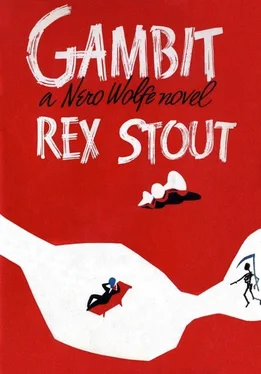
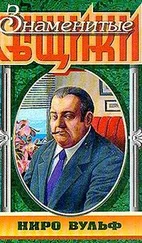
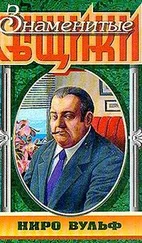

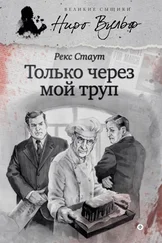

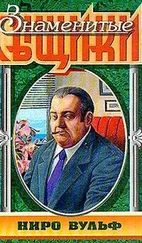
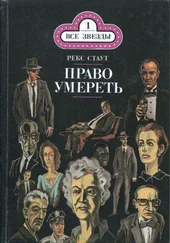
![Рекс Стаут - Лига перепуганных мужчин [litres]](/books/394342/reks-staut-liga-perepugannyh-muzhchin-litres-thumb.webp)